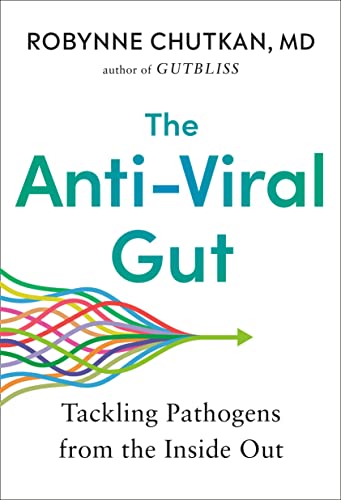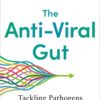

From: $120.00
Learn gut-based, immuno-supportive nutrition and lifestyle strategies to help decrease viral susceptibility and promote viral infection recovery. Help your clients prioritize gut health with easy-to-implement recommendations and practical guidance. Features:
This course is CDR-approved for 15.25 CPEU for RD/RDNs and DTR/NDTRs, and CBDCE-approved for 15.25 CEU for CDCES’s. Please note course expiration date below.
CPEU/CEU: 15.25
Course Expiration Date: 03/31/2026. You have until that date to complete your CPEU Evaluation or Webinar Feedback Survey for this course.
The Anti-Viral Gut: Tackling Pathogens from the Inside Out CE Course
Course Type: 720—Preapproved Self-Study Materials, Printed.
Includes CE Evaluation/Reporting Form: You will submit it online and receive your CE Certificate immediately.
Suggested Learning Level: 2
Gut health is key for immune system resilience, and it can be restored and optimized with evidence-based, actionable steps. Learn how nutrition and environmental factors can wreak havoc on a healthy microbiome balance. Gain powerful and practical nutrition and lifestyle tips to optimize and protect gut health and viral resistance and recovery. Apply easy-to-implement changes to the nutrition and health plans of your clients to make a big impact. Written by integrative gastroenterologist Dr. Robynne Chutkan, MD, this resource provides a wealth of knowledge and practical strategies to enhance gut-immune health.
Features:
Nutrition and lifestyle choices are the foundation for microbiome and immune health. Gain a comprehensive understanding of the gut-immune connection and gain powerful and practical tips for avoiding or recovering from a viral illness. Prioritize your gut health with easy-to-implement changes to your nutrition and health plan. The Anti-Viral Gut: Tackling Pathogens from the Inside Out CE course provides the information and guidance you need to help your clients build and maintain a strong immune system.
Published 2022. 257 pages. 15.25 CPEU CE Course. See the PIs tab for suggested Performance Indicators.
Discover Skelly Skills’ other functional and integrative nutrition CE courses.
Learn more about author Robynne Chutkan, MD.
CPEU/CEU: 15.25 NOTE: Course Expiration Date: 03/31/2026. You have until that date to complete your CPEU Evaluation or Webinar Feedback Survey for this course.
1.1.1 Participates and documents engagement in professional development activities to maintain and enhance competence.
1.1.2 Pursues and embraces opportunities to advance practice.
1.1.3 Keeps abreast of changes in practice and in the practice environment that affect individual competence and legislative scope
1.1.5 Integrates new knowledge and skills into practice.
1.3 Recognizes and manages situations with ethical implications.
1.4 Respects client autonomy to make decisions about proposed services.
1.7 Applies cultural competence and consideration for social determinants of health to show respect for individuals, groups and populations.
1.8 Demonstrates sustainable practices that are socially responsible, efficient, effective and environmentally friendly.
1.7.3 Develops awareness of one’s own personal beliefs and values to inform and reduce biases.
1.8.2 Demonstrates an awareness of the impact of sustainability on the health and well-being of individuals and populations.
1.8.3 Identifies the impact of waste on the environment and takes steps to minimize waste.
1.8.4 Identifies factors that influence and impact a sustainable food system and takes steps to support and promote sustainability.
1.8.5 Recommends sustainable diets and meal plans that are healthy, culturally relevant, accessible, economically fair and affordable, and respectful of their impact on land, water, air and energy use.
2.1.1 Assesses the communication needs of individuals, groups and populations to provide effective communication.
2.2.2 Delivers information and opinions in a respectful and professional manner.
3.2 Advocates for and participates in activities that support advancement of the profession.
3.3 Advocates for nutrition and dietetics services and resources for clients and populations.
4.1 Demonstrates sound professional judgement and strategic thinking in practice.
4.1.2 Interprets and integrates evidence-based research and literature in decision-making.
4.1.3 Identifies misinformation and inaccurate information in order to inform decision-making.
4.2 Exercises critical thinking when faced with opportunities and challenges.
4.2.2 Reflects on own values, beliefs and biases.
4.2.3 Demonstrates insight concerning personal expertise and limitations.
4.2.4 Investigates alternative explanations for deficits or challenges and considers alternative methods and provides justification for selected option(s).
4.2.5 Analyzes and synthesizes information and identifies new information, patterns and findings.
4.2.6 Integrates relevant information with previous learning, experience, professional knowledge, and current practice models.
6.1.1 Identifies gaps in evidence to determine research priorities.
6.1.2 Uses established benchmarking to inform practice.
6.1.4 Defines and establishes appropriate research methodology approaches (e.g. quantitative and qualitative methods).
6.2.3 Analyzes and interprets data to form valid conclusions and to make recommendations.
6.3.1 Accurately and ethically shares research findings with a variety of audiences.
6.3.2 Utilizes innovative ways to disseminate research findings considering the target audiences.
6.4.2 Demonstrates serious inquiry, examination, and experimentation aimed at the discovery and interpretation of knowledge, or the revision of guidelines, theories, policies or laws.
6.8.1 Masters and maintains current and evidence-based knowledge within subject areas.
7.2 Applies principles, standards, regulations and organizational policies to promote food safety.
7.2.3 Communicates the role of sustainable food practices and food and water insecurity for populations.
7.3.1 Recognizes the environmental implications of infectious diseases, compromised health conditions and outbreaks, and implements preventive action for public safety.
8.1.1 Interprets and applies evidence-based comparative standards for determining nutritional needs.
8.1.2 Applies knowledge of food and nutrition as well as the biological, physical and social sciences in practice.
8.1.4 Integrates knowledge of macro- and micronutrients for digestion, absorption and metabolism throughout the lifespan in practice.
8.1.5 Applies medical nutrition therapy in disease prevention and management.
8.2.1 Assesses the physical, social and cultural needs of the individual, group, community or population.
8.2.2 Applies knowledge of health determinants when planning, developing and implementing services, programs, meal plans and menus.
8.2.3 Analyzes new information and how it impacts medical nutrition therapy.
8.2.4 Integrates new knowledge of disease states and clinical conditions into practice.
8.3.1 Discusses with clients the Physical Activity (PA) Guidelines for Americans and the relationships between exercise, health, and disease prevention.
8.4 Critically evaluates the safety and efficacy of integrative and functional medicine approaches and interventions.
8.4.1 Gains an understanding of integrative and functional medicine models and interventions and how these models and interventions are applied to nutrition and dietetics service.
8.4.2 Critically evaluates the credibility of integrative and functional medicine research and literature, using evidence-based criteria, to respond to inquiries and to determine the appropriateness of incorporating these interventions into nutrition care plans.
8.4.3 Identifies research gaps to support conscious decision-making.
8.4.4 Identifies safety issues, risks, efficacies, benefits and limitations of interventions.
8.4.5 Critically evaluates the safety and efficacy of traditional and pharmaceutical models.
8.5.4 Takes into consideration client/patient choices, beliefs, food sensitivities, allergies, and accessibility and affordability of food.
9.1.3 Identifies and analyzes factors that influence change in behaviors.
9.2.1 Assesses learning needs of the individual or target group.
9.4.6 Uses socially and culturally appropriate strategies in order to respect diverse cultures and values.
9.6.1 Assesses client/patient nutritional needs and appropriateness of the counseling.
10.1.2 Conducts nutrition screening to identify client/patient risks and levels of criticality, and to direct services.
10.2.1 Selects valid and reliable tools to conduct comprehensive nutrition assessments.
10.2.3 Collects information related to client/patient use of medications, dietary supplements and integrative and functional medicines to identify potential adverse drug and nutrient interaction.
10.2.8 Recommends biochemical tests and reviews results to support diagnoses and plans of care.
10.2.9 Orders biochemical tests and reviews results to support diagnoses and plans of care.
10.2.12 Gathers information that affects intake and nutrition and health status (e.g., cultural, ethnic, religious, lifestyle influencers, psychosocial, and social determinants of health).
10.3.4 Selects interventions intended to resolve or improve nutrition diagnoses.
10.4 Prescribes, recommends and administers nutrition-related pharmacotherapy to support optimal patient/client outcomes according to standard of practice, legislation and organizational policies.
10.4.1 Identifies classifications of nutraceutical pharmacological agents and the action on the body.
10.4.3 Identifies potential food-nutrient drug interactions based on physiological responses to pharmacological agents and takes appropriate action.
10.4.4 Considers client/patient factors, nutritional impacts, indications, side effects, contraindications, benefits, risks, alternatives and foundational sciences when prescribing, recommending or administering nutrition-related drug therapy.
10.4.7 Evaluates, educates and counsels on the interrelationship and impact of pharmacotherapy on nutrients.
10.5.1 Reevaluates and adjusts plans of care to support client/patient health goals.
10.5.2 Monitors and identifies factors affecting client/patient progress in meeting goals.
10.5.3 Adjusts interventions based on client/patient progress in meeting established goals.
10.5.4 Establishes new goals and nutrition care plans when original or interim goals are met.
12.2.1 Identifies determinants of health and influences on population health status.
Only logged in customers who have purchased this product may leave a review.
Skelly Skills is a provider of continuing education for dietitians (RD/RDNs), certified diabetes care and education specialists (CDCESs), registered nurses (RNs) and diet technicians, registered (DTR/NDTR). We provide CPE, (often called CEU, CE, and CPEU) for all of these groups, and all of our courses are approved for CE by the Commission on Dietetic Registration (CDR) and the CBDCE for CDCESs. Skelly Skills receives no commercial support and does not accept advertising or sponsorship of any kind.

CPEU/CEU: 41

CPEU/CEU: 21

CPEU/CEU: 16

CPEU/CEU: 16


Purchase your webinar and receive a link to the webinar immediately.
Watch your webinar and then submit the CE Feedback Survey form by the course expiration date.
After submitting your CE Feedback Survey, you will be able to download your CPEU/CEU certificate as a pdf and keep for your records.

We use cookies to ensure you get the best experience. By using our website or clicking "accept", you consent to cookies.
Kelly Myhalenko, RDN –
Extremely informative, especially for someone who has chronic digestive issues and family members with Crohn’s disease.
Allison Coffey, DTR, Brighton, MI –
I thought this course was valuable. I learned a lot about gut health. I really didn’t understand about “leaky gut.” Now I do!
Kelsea Hoover, MSN, RDN, –
This course was extremely valuable. I learned about the mechanisms connecting gut health to immune system health in more depth than I previously knew. I feel like these learnings can easily be incorporated into my practice to improve motivation, excitement, and positive outcomes for my patients.